2024 Reading List
1 Buddy Holly is Alive and Well on Ganymede Bradley Denton 2 Paul and the Resurrection of Israel: Jews, Former Gentiles, Israelites Jason Staples 3 Clothes, Clothes, Clothes. Music, Music, Music. Boys, Boys, Boys. Viv Albertine 4 We Yevgeny Zamyatin 5 Surprised by Joy C. S. Lewis 6 The Wolf of Wall Street Jordan Belfort 7 Catching The Wolf of Wall Street Jordan Belfort 8 Embracing the Journey Greg and Lynn McDonald 9 Fritz Lieber: Selected Stories Fritz Lieber 10 Genesis John H. Sailhammer 11 Genesis: Translation and Commentary Robert Alter 12 Genesis: Beginning and Blessing R. Kent Hughes 13 The Longview Roger Parrott, PhD 14 The Last Dangerous Visions Harlan Ellison
Slow year. Started an additional 7 books that I haven't finished.
Elephant's Breath
I read this passage in Viv Albertine's "Clothes3. Music3. Boys3":
Each morning I start again with the questions, easy stuff, like colour – I’ve always been drawn to colour. Mum made colour interesting for me, when I was little; she would say, ‘See the colour of that woman’s skirt? That’s called elephant’s breath.’ Or, ‘See that ribbon? It’s mint green...
I had never heard of "elephant's breath" before. It's a paint color from the British manufacturer Farrow and Ball. This site says that the RGB values for Elephant's Breath are 204, 191, 179. ChatGPT says that the RGB values are 187, 173, 160.
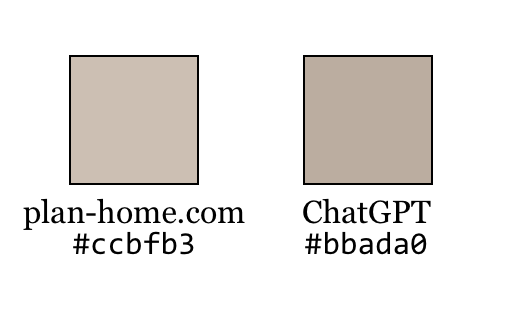
ChatGPT draws it as:
2023 Reading List
1 The Cyberiad Stanislaw Lem 2 Circus World Barry B. Longyear 3 A Wizard of Earthsea Ursula K. Le Guin 4 The Tombs of Atuan Ursula K. Le Guin 5 The Farthest Shore Ursula K. Le Guin 6 Power Failure Mimi Swartz & Sherron Watkins 7 A Boisterously Reformed Polemic Against Limited Atonement Austin Brown 8 The Smartest Guys in the Room Bethany McLean & Peter Elkins 9 Tehanu Ursula K. Le Guin 10 Tales From Earthsea Ursula K. Le Guin 11 The Theology of the Reformed Confessions Karl Barth 12 The Best of Cordwainer Smith Cordwainer Smith 13 The Other Wind Ursula K. Le Guin 14 The Daughter of Odren Ursula K. Le Guin 15 Planet of the Damned Harry Harrison 16 Vital Grace Tom Wood 17 Originals Adam Grant 18 The Diary of a Young Girl Anne Frank 19 The Great Divorce C. S. Lewis 20 Collective Illusions Todd Rose 21 Apologetics Beyond Reason James W. Sire 22 The Wiersbe Bible Study Series: John Warren W. Wiersbe 23 The Day the Revolution Began N. T. Wright 24 Love Ain't Nothing But Sex Misspelled Harlan Ellison 25 Being God's Image Carmen Joy Ames 26 Seven Things I Wish Christians Knew About the Bible Michael F. Bird
A Review of "Vital Grace"
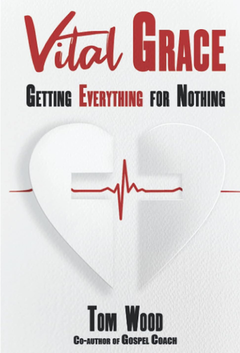
Tom gets many things right. I told him on Sunday that I think that our church should make a class available with this book as the text. Having said that, now I'm going to "knife the baby" (not really. It's more of a deep exfoliation). Knowing me as he does, he expects no less because the purpose of a critical review is to make the next edition of the book even better.
Read More...
A Diplomatic Review of "A Boisterous Polemic"
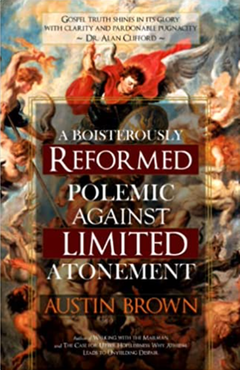
[updated 11/15/2024, see footnote 6]
For whom did Christ die? A "5-point" Calvinist will answer, "for the elect only". A "4-point" or "moderate" Calvinist will answer "for everyone, but especially for the elect." "A Boisterously Reformed Polemic Against Limited Atonement", by Austin C. Brown, looks at the evidence for each answer and comes down on the side of the moderate Calvinist.
For the sake of brevity, I will use "5P" and "4P" to refer to the respective five point and four point positions.
My first observation, which should not be controversial, is that there is a typo in the Kindle version on page 190/191: "This happened to me twice. Once during the examination process to be become a deacon in the RPCNA and during my examination...". My remaining observations, save the penultimate, will be in areas where I think Brown could present a stronger argument. The next to last observation will be in the way of personal application.
Read More...
Critiquing Calvinism
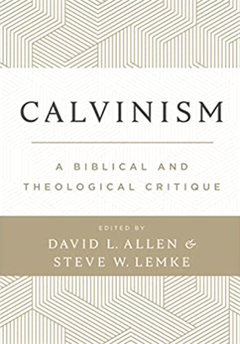
... the Remonstrants were concerned about the teaching that God forces his grace on sinners irresistibly. [emphasis mine]
...
Bending the will of a fallible being by an omnipotent Being powerfully and unfailingly is not merely sweet persuasion. It is forcing one to change one’s mind against one’s will.
...
God changing our will invincibly in irresistible grace brings to mind phenomena such as hypnotism or brainwashing.
...
Note the striking contradiction—God will “overcome all resistance and make his influence irresistible,” and yet “irresistible grace never implies that God forces us to believe against our will.” No attempt is made in the article to reconcile these apparently contradictory assertions.
I will try to reconcile these allegedly contradictory assertions. The idea that God forces the spiritually dead to awaken to life in Christ is common in Arminian arguments. But it simply isn't what God does. "Aha!" moments, "Eureka!" moments rise from the recesses of our minds and present to us a new way of seeing, a new way of thinking, and that new thing is so obvious that we wonder why we never encountered it before. Of course we embrace it. Why would we not? It has positively transformed a part of our life.
Lemke asks:
Why would there be a need to persuade someone who had already been regenerated by irresistible enabling grace?
God works through His word: written, oral, or otherwise. He gives sight to the blind and hearing to the deaf (Ex. 4:11). He gives transforming inspiration. Regeneration and persuasion go hand in hand. He regenerates through persuasion and persuades through regeneration.
I am reminded of the scene in "The Wizard of Oz" when Dorothy opens the door of her house and sees Oz in color. Before then, everything was in black and white. The external change of location which brought color into her life is a parallel to the internal change that brings new sight to the Christian. What Dorothy saw on the outside the Christian sees on the inside.

[1] The "marriage" argument. It is argued that Christ died for His bride, the Church, to "sanctify it, having cleansed it." [Eph 5:25-27].
There is an inseparable unity between Christ's death for the church and his sanctifying and cleansing it. Those from whom he died he also sanctifies and cleanses. Since the world is not sanctified and cleansed, then it is obvious that Christ did not die for it.
– Edwin H. Palmer, "The Five Points of Calvinism".
I don't think this argument survives Isaiah 54:5:
For your Maker is your husband, the Lord of hosts is his name; ...
– NRSV
Which makes 1 Cor 7:15 all the more interesting.
2022 Reading List
1 Space Chanty R. A. Lafferty 2 The Witches of Karres James H. Schmitz 3 The Wizard of Karres M. Lackey, E. Flint, D. Freer 4 The Sorceress of Karres E. Flint, D. Freer 5 The Shaman of Karres E. Flint, D. Freer 6 The Idea of Israel in Second Temple Judaism Jason Staples 7 Do Android's Dream of Electric Sheep Philip K. Dick 8 Miami Blues Charles Willeford 9 New Hope for the Dead Charles Willeford 10 Sideswipe Charles Willeford 11 The Way We Die Now Charles Willeford 12 The Hobbit J. R. R. Tolkien 13 The Burnt Orange Heresy Charles Willeford 14 A Canticle for Leibowitz Walter M. Miller, Jr. 15 Gospel Coach Scott Thomas & Tom Wood 16 Solaris Stanislaw Lem 17 Not All Who Wander (Spiritually) Are Lost Traci Rhoades 18 The Mountain of Silence Kyriacos C. Markides 19 He Is There And He Is Not Silent Francis A. Schaeffer 20 The Region Between Harlan Ellison 21 True Spirituality Francis A. Schaeffer 22 The Orville: Sympathy for the Devil Seth MacFarlane 23 The Word for World is Forest Ursula K. Le Guin 24 Believing Philosophy Dolores G. Morris 25 The Epic of Eden Sandra L. Richter 26 Five Ways to Forgiveness Ursula K. Le Guin 26 The Westminster Assembly Robert Letham 27 Old Testament Theology in a Canonical Context Brevard S. Childs 28 The Year's Best Science Fiction, First Annual Collection Gardner Dozois 29 The Martian Chronicles Ray Bradbury 30 What Did The Cross Accomplish? S. Gathercole, R. B. Stewart, N. T. Wright 31 Howard Who? Howard Waldrop
2021 Reading List
1 The Warlock In Spite Of Himself Christopher Stasheff 2 Zen and the Art of Motorcycle Maintenance Robert M. Pirsig 3 The Genius in Your Wound Allan Dayhoff 4 The Best of R. A. Lafferty R. A. Lafferty 5 Revelations of a Spirit Medium A Medium 6 Loserthink Scott Adams 7 World Without Stars Poul Anderson 8 Breakfast With Socrates Robert Rowland Smith 9 Science and the Good James Hunter and Paul Nedelisky 10 Hinds Feet On High Places Hannah Hurnard 11 The Sirens of Titan Kurt Vonnegut 12 Through Two Doors At Once Anil Ananthaswamy 13 Okla Hannali R. A. Lafferty 14 The Accidents Caleb Hannan 15 The Great Divorce C. S. Lewis 16 Puritanism and Natural Theology Wallace W. Marshall 17 The Space Trilogy C. S. Lewis 18 Stories of Your Life and Others Ted Chiang 19 Seven and a Half Lessons About the Brain Lisa Feldman Barrett 20 The Reefs of Earth R. A. Lafferty 21 Podkayne of Marks Robert A. Heinlein 22 The Restless Clock Jessica Riskin 23 R.U.R. Karel Čapek 24 The Cuckoo's Egg Clifford Stoll 25 High Crimes (Audiobook) Michael Kodas 26 Murder on the Orient Express Agatha Christie 27 Brightness Falls from the Air James Tiptree, Jr. 28 The Extent of the Atonement David L. Allen 29 Simply Trinity Isaac Asimov 30 Foundation Isaac Asimov 31 Foundation and Empire Isaac Asimov 32 Second Foundation Isaac Asimov 33 What Is A Girl Worth Rachael Denhollander 34 Foundation's Edge Isaac Asimov 35 Foundation and Earth Isaac Asimov 36 Postmodernism For Beginners Jim Powell 37 What Do We Really Know? Simon Blackburn 38 Gödel's Proof Ernest Nagel & James R. Newman 39 When Did Eve Sin? Jeffrey J. Niehaus 40 Dominion Tom Holland 41 Exhalation Ted Chiang 42 Rendezvous with Rama Arthur C. Clarke
2020 Reading List
1 The Parables of Grace Robert Farrar Capon 2 The Puppet Masters Robert A. Heinlein 3 Christianity and Liberalism J. Gresham Machen 4 The Witches of Karres James H. Schmitz 5 The Twelfth Victim Linda M. Battisti & John Stevens Berry, Sr. 6 Street Level Romans Michael Baer 7 Creation Myths: Revised Edition Marie-Louise Von Franz 8 Breakfast At Tiffany's Truman Capote 9 The Teaching of Jesus concerning the Kingdom of God and the Church Geerhardus Vos 10 The Dispossessed Ursula K. Le Guin 11 The God Delusion Debate (Transcript) Richard Dawkins & John Lennox 12 The Computer and the Brain John Von Neumann 13 Divine Misfortune A. Lee. Martinez 14 The Unknowable Gregory J. Chaitin 15 Warren-Flew Debate On The Existence of God Thomas B. Warren & Antony G. Flew 16 Agile Conversations Squirrel & Fredrick 17 The Divine Dance Richard Rohr & Mike Morrell 18 The Letter to the Romans William Barclay 19 Natural Theology Jean Rioux 20 Jesus and the Forces of Death Matthew Thiessen 21 Paul: A New Covenant Jew Pitre, Barber, Kincaid 22 The Prodigal God Timothy Keller 23 The Emperor's New Mind Roger Penrose 24 Worlds of Exile and Illusion Ursula K. Le Guin 25 Recovering from Biblical Manhood and Womanhood Aimee Byrd 26 The Parasitic Mind Gad Saad 27 Uniform Decisions John Caprarelli 28 But What If We're Wrong Chuck Klosterman 29 The R. A. Lafferty Fantastic MegaPack R. A. Lafferty 30 The Golden Apples Eudora Welty 31 Stardance Spider & Jeanne Robinson
The Prodigal God
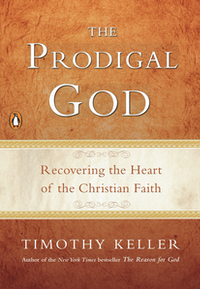
It's not a bad book. It provides some interesting insight into the story of the two sons and how the two sons are really us. I consider it an interesting companion to Capon's Kingdom, Grace, Judgement.
But, given my high expectations, and the five star rating currently on Amazon, the book was almost completely ruined by this one passage:
...the prerequisite for receiving the grace of God is to know you need it.
There is no more wrong statement than this. There is no prerequisite for receiving God's grace, because it is God's grace that opens your eyes to your need in the first place. Presbyterians are funny creatures. They hold to the tenets of Calvinism that says that God's grace is irresistible and that there is nothing man can do to merit grace, then say things like this.
A lesser peeve is that Keller wants to redefine what "sin" means. He writes,
... sin is not just breaking the rules, it is putting yourself in the place of God as Savior, Lord, and Judge...
This fails to make this case, since the very first rule (at least as given to Moses) is "You shall have no other gods before me," and the behavior described by Keller breaks this rule.
Finally, Keller agrees with those who hear Jesus' cry from the cross, "Eloi, Eloi, lema sabachthani?", and conclude that in that moment of pain and darkness that His Father turned His back on His Son and abandoned Him:
He was expelled from the presence of the Father, he was thrust into the darkness, the uttermost despair of spiritual alienation...
I am forever grateful to my mentor, Mike Baer, who once related the wise words of a nun who said, "I'm willing to be the second person God ever forsook." Because God never forsakes His people -- most of all the One who dwells in the "bosom of the Father" (John 1:18). Jesus couldn't say, "go read Psalm 22". The text didn't have those divisions then. By saying the first line of Psalm 22, Jesus was pointing to the end of the Psalm, which tells of rescue and victory.
Am I being too hard on Keller? Possibly. But with his stature comes greater responsibility.
2019 Reading List
1 The Grand Fenwick Book Series Leonard Wibberley 2 On Being Presbyterian Sean Michael Lucas 3 Five English Reformers J. C. Ryle 4 Dangerous Visions Harlan Ellison 5 Witch World Andre Norton 6 Ceremony Leslie Marmon Silko 7 A Clockwork Orange Anthony Burgess 8 Hallelujah Dave David Valdez 9 Moderan David R. Bunch 10 The Ultimate Hitchhiker's Guide to the Galaxy Douglas Adams 11 Philosophy in Minutes Marcus Weeks 12 The Epistle to the Ephesians Karl Barth 13 Chance and the Sovereignty of God Vern S. Poythress 14 Holiness by Grace Bryan Chapell 15 Lost in the Cosmos Percy Walker 16 Breaking Down the Sacred-Secular Divide Michael R. Baer 17 So Say We All Edward Gross & Mark A. Altman 18 A Journey Through Ephesus David Gwartney 19 Business as Mission Michael R. Baer 20 On The Existence of Gods Dominic Saltarelli & Vox Day 21 Why Call Them Back From Heaven Clifford Simak 22 Tactics Gregory Koukl 23 One, Two, Three David Berlinski 24 Nature and Scripture Cornelius van Til 25 Sailing To Byzantium Robert Silverberg 26 Past Master R. A. Lafferty 27 Deception in Gospel Presentation Larry Adams 28 Just Mercy Bryan Stevenson 29 Functional Programming Through Lambda Calculus Greg Michaelson 30 Twisted Fairy Tales Anthology Alternate Ending Publications 31 AD 70 and the End of the World Paul Ellis 32 The Parables of Judgement Robert Farrar Capon 33 Free Will: The Basics Meghan Griffith 34 The Parables of The Kingdom Robert Farrar Capon
Why Call Them Back From Heaven
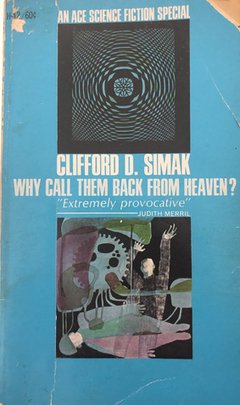
This was said about a corporation that promised immortality in the future for people cryogenically stored. However, the people had to prepare for their awakening by investing for tomorrow. They lived in poverty that they might have riches later. In addition, where to put billions upon billions of people was an unsolved problem that admitted no good solution.
If this was meant to pose a problem of Christianity then, while interesting, ignored the new heaven and earth, which will not be like anything we are familiar with.
2018 Reading List
1 On Wings of Song Thomas M. Disch 2 The Left Hand of Darkness Ursula K. Le Guin 3 Humanity Prime Bruce McAllister 4 Fahrenheit 451 Ray Bradbury 5 Till We Have Faces C. S. Lewis 6 Seeking Allah, Finding Jesus Nabeel Qureshi 7 Nicaea and it’s Legacy Lewis Ayres 8 After Things Fell Apart Ron Goulart 9 The Truth About Uri Geller James Randi 10 Flim-Flam James Randi 11 Ship of Fools C. R. Hallpike 12 The Future of the People of God Andrew Perriman 13 The Last Days According to Jesus R. C. Sproul
Still reading: Ceremony, by Leslie Marmon Silko; Lost in the Cosmos, by Walker Percy; The Female Man, by Joanna Russ; Common Lisp Recipes, by Edi Weitz; The Letter to the Colossians and to Philemon, by Douglas Moo; Infinity and the Mind, by Rudy Rucker.
The Trinity by Dale Tuggy : A Critique
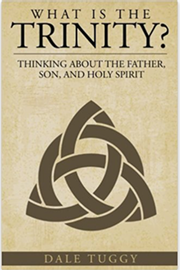
Read More...
2016 Reading List
1 Gentleman Jole and the Red Queen Lois McMaster Bujold 2 Coffee, Tea, or Me? Donald Bain 3 A Wild Sheep Chase Haruki Murakami 4 On the Existence of Gods Saltarelli & Day 5 Dune Frank Herbert 6 Disrupted Dan Lyons 7 The History of the Church Eusebius of Caesarea 8 Logicomix: An Epic Search For Truth Doxiadis & Papadimitriou 9 Dialogs Concerning Natural Religion David Hume 10 The Princess Diarist Carrie Fisher 11 MASH Richard Hooker
Just a horrible year for books. I started too many books that I just couldn't finish, mostly because they were badly written. The worst of the bunch was "Jesus Outside the Lines". An utter waste of time and money.
"Stirring the emerald green"

For some reason, I was entranced by the phrase "stirring the emerald green." It's a beautiful combination of words. But what could it possibly mean? There was nothing in the text up to that point that hinted at what she might have been doing.
She banged her hands on her hipbones, enough to hurt, flung around, and went back to her own business. On one bare foot with the other crossed over it, she stood gazing down at the pots and dishes in which she had enough color stirred up to make a sunburst design. She was shut up in here to tie-and-die a scarf. [pg. 34, 36]
Now it all makes sense!
I found this book at Riverby Books in Fredericksburg, VA and bought it on a whim because Welty lived near Belhaven University, where my daughter went to school. Welty's style is reminiscent of Ray Bradbury and Bradbury notes her influence on his writing.
Read More...
2015 Reading List
1 All You Zombies Robert Heinlein 2 The Puppet Masters Robert Heinlein 3 Revolt in 2100 Robert Heinlein 4 Stand on Zanzibar John Brunner 5 Do Androids Dream of Electric Sheep Philip K. Dick 6 Neutron Star Larry Niven 7 Strange Stones Peter Hessler 8 The Nominated Short Works John C. Wright 9 The City on the Edge of Forever Harlan Ellison 10 Vic and Blood Harlan Ellison 11 Dangerous Visions Harlan Ellison 12 Mention My Name In Atlantis John Jakes 13 Tokyo Vice Jake Adelstein 14 The Old Man and the Sea Ernest Hemingway 15 Primates of Park Avenue Wednesday Martin 16 Of Mice and Men John Steinbeck 17 The Best Laid Schemes Larry Eisenberg 18 And Then There Were None Agatha Christie 19 SJWs Always Lie Vox Day 20 QED: The Strange Theory of Light and Matter Richard Feynman 21 The Meaning Of It All Richard Feynman 22 The Shape of Inner Space Shing-Tung Yau 23 Does God Control Everything? R. C. Sproul 24 The Space Trilogy C. S. Lewis 25 Natural Theology Emil Brunner & Karl Barth
Additionally, I've started, but not completed, these books:
1 The History of the Church Eusebius of Caesarea 2 Philosophy of Mind Edward Feser 3 Beyond Good and Evil Frederich Nietzsche 4 Systematic Theology Louis Berhkof 5 Somewither John C. Wright 6 Riding the Red Horse Tom Kratman 7 Freedom of the Will Jonathan Edwards 8 Systematic Theology: An Introduction to Biblical Doctrine Wayne Grudem 9 Paul's Letter to the Romans Colin G. Kruse 10 How to Read Slowly James W. Sire 11 Javascript and JQuery Jon Duckett
2014 Reading List
1 The Magazine of Fantasy and Science Fiction Mar-Apr 2014 2 That Hideous Strength C. S. Lewis 3 Them Jon Ronson 4 Tower of Glass Robert Silverberg 5 Awake in the Night Lands John C. Wright 6 Frankenstein Mary W. Shelley 7 Surely You're Joking, Mr. Feynman Richard P. Feynman 8 A History of Heresy David Christie-Murray 9 The Decline and Fall of IBM Robert X. Cringely 10 Mountain Spirits: A Chronicle ... Joseph Earl Dabney 11 Luckiest Man: The Life and Death of Lou Gehrig Jonathan Eig 12 Art Theory: A Very Short Introduction Cynthia Freeland 13 Almost Perfect W. E. Pete Peterson 14 One Bright Star to Guide Them John C. Wright 15 Friday Robert Heinlein 16 The Falling Woman Pat Murphy 17 Flatland Edwin A. Abbott 18 The Unpleasant Profession of Jonathan Hoag Robert Heinlein 19 Farnham's Freehold Robert Heinlein
Friday

But don't judge the book by its cover. Friday is a very special woman. One who is gifted far beyond most people and yet so incredibly naive. Almost childlike: trusting people she has no reason to trust and being driven by people and events beyond her control. She is horribly abused early the book (cf. the "nasty bit of torture"), but this is only an extreme example of her life to date. This is the story of what it means to be human, of coming of age, and especially the search to find a place where one belongs. Home.
Some passages that particularly stood out this time around:
Read More...
Tower Of Glass

A message has been received from interstellar space. Simeon Krug, having made a vast fortune by creating and commercializing androids, uses android labor to construct a vast tower in the Canadian tundra -- a tower that will house a tachyon transmitter to send a reply.
The tower is but a framing device -- a re-imagined tower of Babel -- to explore what it means to be human. I now appreciate why it was nominated for both Hugo and Nebula awards.
2013 Reading List
1 An Introduction to Information Theory John R. Pierce 2 Dandelion Wine Ray Bradbury 3 The Martian Chronicles Ray Bradbury 4 Defending Jacob William Landay 5 Solaris Stanislaw Lem 6 The Monster of Florence Preston & Spezi 7 Stranger In A Strange Land Robert A. Heinlein 8 The Mathematical Universe William Dunham 9 The World of Null-A A. E. Van Vogt 10 Triple Tap Fred Reed 11 Killer Kink Fred Reed 12 Tau Zero Poul Anderson 13 Quantum Computing Since Democritus Scott Aaronson 14 The Collector John Fowles
Marginally better than 2012, but still nowhere near what I ought to be doing. And this year is even worse. It's almost the end of April and I've only finished two books even though I've started reading five or six.
Gems from John R. Pierce
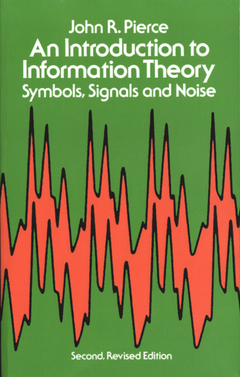
"Mathematically, white Gaussian noise, which contains all frequencies equally, is the epitome of the various and unexpected. It is the least predictable, the most original of sounds. To a human being, however, all white Gaussian noise sounds alike. It's subtleties are hidden from him, and he says that it is dull and monotonous. If a human being finds monotonous that which is mathematically most various and unpredictable, what does he find fresh and interesting? To be able to call a thing new, he must be able to distinguish it from that which is old. To be distinguishable, sounds must be to a degree familiar. … We can be surprised repeatedly only by contrast with that which is familiar, not by chaos." [pg. 251, 267]
2012 Reading List
1 The Best of Gene Wolfe Gene Wolfe 2 The Last Hurrah Of The Golden Horde Norman Spinrad 3 The Einstein Intersection Samuel R. Delany 4 Rabbit, Run John Updike 5 The Consequences of Ideas R. C. Sproul 6 Dandelion Wine Ray Bradbury 7 The Man Who Knew Too Much G. K. Chesterton 8 I'll Go Home Then; It's Warm and Has Chairs David Thorne 9 The Case for the Real Jesus Lee Strobel 10 The Midnight Dancers Gerard F. Conway 11 The Drunkard's Walk: How Randomness Rules Our Lives Leonard Mlodinow re-read 12 Captain Vorpatril's Alliance Lois McMaster Bujold 13 Generous Justice Timothy Keller
Quite a difference from last year, when I read fifty-one books. Work has been all consuming. There's a problem when, while I'm supposedly on vacation, a co-worker writes in an e-mail, "… color me impressed, you remain one of the most productive on the team, and this all while on PTO!" (Paid Time Off).
[Updated 1/3/13 to include "The Midnight Dancers", which was inadvertently omitted.]
2011 Reading List
1 A Confederacy of Dunces John Kennedy Toole 2 The Evolution of Cooperation Robert Axelrod 3 Bug Jack Barron Norman Spinrad 4 Cryroburn Lois McMaster Bujold 5 Cordelia’s Honor Lois McMaster Bujold 6 Young Miles Lois McMaster Bujold 7 Miles, Mystery and Mayhem Lois McMaster Bujold 8 Miles Errant Lois McMaster Bujold 9 Miles in Love Lois McMaster Bujold 10 Miles, Mutants and Microbes Lois McMaster Bujold 11 How To Teach Physics To Your Dog Chad Orzel 12 Old Testament Parallels Victor H. Matthews & Don C. Benjamin 13 Information: A Very Short Introduction Luciano Floridi 14 The Left Hand Of Darkness Ursula K. Le Guin 15 To Say Nothing Of The Dog Connie Willis 16 The Drunkard's Walk: How Randomness Rules Our Lives Leonard Mlodinow 17 Orphans of Chaos John C. Wright 18 It Came From Schenectady Barry B. Longyear 19 The Turing Omnimbus A. K. Dewdney 20 The Soul of a New Machine Tracy Kidder 21 The Moon Is A Harsh Mistress Robert A. Heinlein 22 I Will Fear No Evil Robert A. Heinlein 23 The Door Into Summer Robert A. Heinlein 24 Brightness Falls From The Air James Tiptree, Jr. 25 The Science Fiction Megapack Anthology 26 Gödel, Escher, Bach Douglas Hofstadter 27 The Mote In God's Eye Larry Niven and Jerry Pournelle 28 The Gripping Hand Larry Niven and Jerry Pournelle 29 Fritz Leiber: Selected Stories Fritz Leiber 30 Storm Over Warlock Andre Norton 31 Buddy Holly Is Alive and Well on Ganymede Bradley Denton 32 Another Fine Myth Robert Asprin 33 Myth Conceptions Robert Asprin 34 Myth Directions Robert Asprin 35 Hit Or Myth Robert Asprin 36 Mtyh-ing Persons Robert Asprin 37 Little Myth Marker Robert Asprin 38 M.Y.T.H. Inc. Link Robert Asprin 39 Myth-Nomers and Im-Pervections Robert Asprin 40 M.Y.T.H. Inc. In Action Robert Asprin 41 Sweet Myth-tery of Life Robert Asprin 42 Myth-Ion Improbable Robert Asprin 43 Something M.Y.T.H. Inc. Robert Asprin 44 Myth-told Tales Robert Asprin with Jody Lynn Nye 45/td> Myth Alliances Robert Asprin with Jody Lynn Nye 46 Myth-taken Identity Robert Asprin with Jody Lynn Nye 47 Class Dis-Mythed Robert Asprin with Jody Lynn Nye 48 Myth-Gotten Gains Robert Asprin with Jody Lynn Nye 49 Myth-Chief Robert Asprin with Jody Lynn Nye 50 Myth-Fortunes Robert Asprin with Jody Lynn Nye 51 Cubism (Movements in Modern Art) David Cottington
1 Zen and the Art of Motorcycle Maintenance Robert M. Pirsig 2 An Introduction to Information Theory John R. Pierce 3 The Consequences of Ideas R. C. Sproul 4 The Best of Gene Wolfe Gene Wolfe 5 Anathem Neal Stephenson 6 Why Men Hate Going To Church David Murrow 7 Mere Christianity C. S. Lewis
Cubism
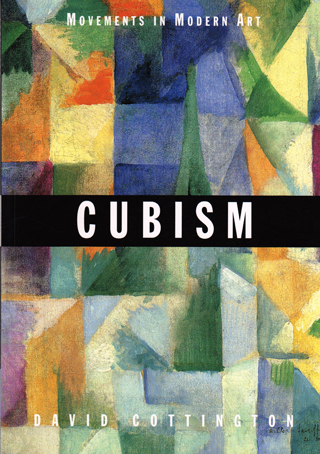

Dispensing with the screen of neo-Impressionist brushstrokes - perhaps recognizing its superfluity, given the constructive potential of the device of a colour grid - Delaunay orchestrates a range of spectral colors around the spatial recession from the foreground orange curtains to the background blue sky and the green profile of the tower. As in the hermetic paintings of Picasso and Braque, the representational legibility of the image is secured by the vestigial iconic character of these motifs. But unlike their exploration and celebration of the linguistic magic of painting for its own sake - or perhaps for its suggestion of a reality beyond appearance - Delaunay's bracketing of his complex and fragmented representation of the cityscape between the external limit of the picture frame/window and the internal limit of the distant tower posits an equivalence between the experience of deciphering the painting and the active, constructive nature of visual perception that life in a modern city entails. [pg 61].
"Vestigial iconic character?" The pointed green triangle-like object is the Eiffel Tower? The blue is the sky? The yellow-orange represents curtains? There's a cityscape in there somewhere? Obviously I am a barbarian, unlearned in the vocabulary of Cubism. Nevertheless, some Cubist art is strikingly beautiful. Even if I don't necessarily know what it means.
Morality in a Fantasy Novel

There wasn't a thinking being alive who deep down didn't feel fundamentally flawed.
This, of course, is one way McCarthy's third design requirement can manifest itself.
In Something M.Y.T.H. Inc., on page 27, another character explains morality in terms of the iterated prisoner's dilemma, even though he likely never took a course in game theory:
"What I mean is, when you're a soldier, you don't have to worry much about how popular you are with the enemy, 'cause mostly you're tryin' to make him dead and you don't expect him to like it. It's different doin' collection work, whether it's protection money or taxes, which is of course just another kind of protection racket. Ya gotta be more diplomatic 'cause you're gonna have to deal with the same people over and over again."
For another example of art revealing life, see the post The Telling.
The Telling
The Telling, by Ursula K. LeGuin is the story of an earth woman, Sutty, who is sent as an observer to the world Aka by the galactic council called the Ekumen. Aka is world where a materialistic, atheistic, hierarchical culture has taken over and brutally suppressed the former “spiritual” communal culture. The bulk of the story deals with Sutty’s attempts to discover and, perhaps, help preserve that second culture.
I found the following passage interesting, as it expresses poetically what I have attempted to describe using concepts from artificial intelligence about the difference between animals and men; that animals are fixed goal creatures while man, having no fixed goal, creates his own goals. LeGuin writes:
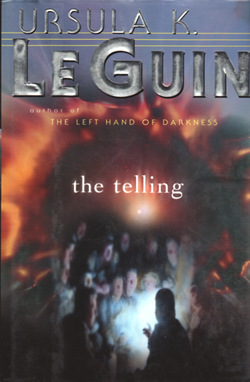
I have to assign this book to second tier status; while it was a moderately enjoyable read, it isn’t “The Left Hand of Darkness” or “A Wizard of Earthsea”.
Operation Chaos
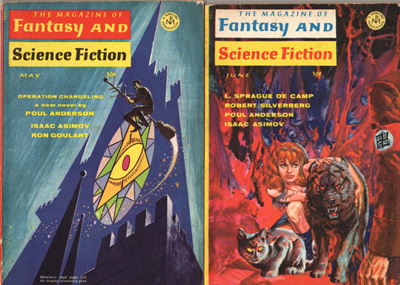
...Heaven is not as narrowly literal-minded as hell.
Whatever else one might say about Anderson’s theological musings, this observation is profoundly true.
Rite of Passage
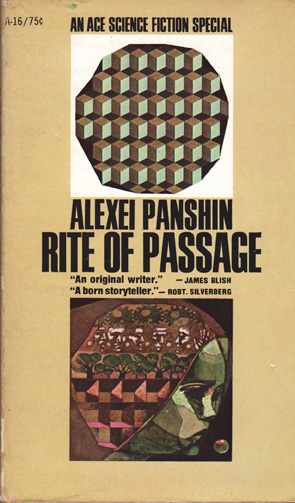
Undergoing a physical ordeal is only one aspect of her transformation from child to woman; she must also undergo a moral transformation and ends up opposing her father on an issue that effects a world.
As part of her attempts to grapple with morality, she has to prepare a paper for school on the subject. She wrote:
What I find interesting is that she uses the "is-ought" definition for morality. I first read this book in high school, yet I didn't remember this part (cf. here).Ethics is the branch of philosophy that concerns itself with conduct, questions of good and evil, right and wrong--and there are a great many of them, because even people who supposedly belong to the same school don't agree a good share of the time and have to be considered separately--can be looked at as a description and as a prescription. Is this what people actually do? Is this what they should do?
She goes on to critique several ethical systems. First, utilitarianism:
Skipping the development and history of utilitarianism, the most popular expression of the doctrine is "the greatest good for the greatest number," which makes it sound like its relative, the economic philosophy communism which, in a sense, is what we live with in the Ship. The common expression of utilitarian good is "the presence of pleasure and the absence of pain."
Speaking descriptively, utilitarianism doesn't hold true, though the utilitarian claims that it does. People do act self-destrucively at times--they know the pleasureful and chose the painful instead. The only way that what people do and what utilitarianism says they do can be matched is by distorting the ordinary meanings of the words "pleasure" and "pain." Besides, notions of what is pleasurable are subject to training and manipulation. The standard is too shifting to be a good one.
I don't like utilitarianism as a prescription, either. Treating pleasure and pain as quantities by which good can be measured seems very mechanical, and people become just another factor to adjust in the equation. Pragmatically, it makes sense to say One hundred lives saved at the cost of one?--go ahead! The utilitarian would say it every time--he would have to say it. But who gave him the right to say it? What if the one doesn't have any choice in the matter, but is blindly sacrificed for, say, one hundred Mudeaters whose very existence he is unaware of? Say the choice was between Daddy or Jimmy and a hundred Mudeaters. I wouldn't make a utilitarian choice and I don't think I could be easily convinced that the answer should be made by the use of the number of pounds of human flesh. People are not objects.
Next, she questions the philosophy of "might makes right."
In effect, the philosophy of power says that you should do anything you can get away with. If you don't get away with it, you were wrong.
You can't really argue with this, you know. It is a self-contained system, logically consistent. It makes no appeal to outside authority and it doesn't stumble over its own definitions.
But I don't like it. For one thing, it isn't a very discriminating standard. There doesn't seem to be any difference between "ethically good" and "ethically better." More important, however, stoics strap themselves in ethically so that their actions have as few results as possible. The adherents of the philosophy of power simply say that the results of their actions have no importance--the philosophy of a two year old throwing a tantrum.
She summarizes:
My paper was a direct discussion and comparison of half-a-dozen ethical systems, concentrating on what seemed to me to be their flaws. I finished by saying that it struck me that all the ethical systems I was discussing were after the fact. That is, that people act as they are disposed to, but they like to feel afterwards that they were right and so they invent systems that approve of their dispositions. This was to say that while I found things like "So act as to treat humanity, whether in your person or in that of another, in every case as an end and not as a means merely," quite attractive principles, I hadn't run into any system that exactly fitted my disposition.
Of course, she would need to examine whether or not an ethical system should fit one's disposition. When should one cede one's moral authority, if ever? Why?
Mirror To The Sky
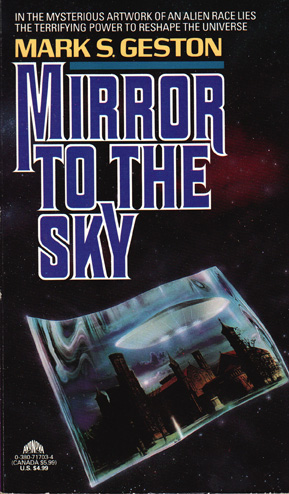
Earth, unlike the aliens, has no comprehensive vision of their destiny. There is nothing to strive for, other than one's daily needs; nothing to drive a people to something greater than themselves. Until the alien artist "Rane" paints an even more powerful work than Blake's masterpiece.
Geston explores several interesting ideas. First, that art can be a source of truth. An idea that is increasingly seen as archaic in a scientific, technological, naturalistic age. Whether art reveals existing truth, or provides the impetus to create the truth, is left open. Second, are the various reactions to truth. Some are immediately struck by it. Others cannot see it at all. Some embrace it wholeheartedly and want to spread the word. Others are afraid and want to hide it.
The book leaves us with the notion that, in the end, the truth is inevitable. And the alien artist Blake was right. It is terrifying.
A conclusion that only solidified in my mind while writing this review. Some of us are slow to grasp the truth. But better late than never.
Pity About Earth
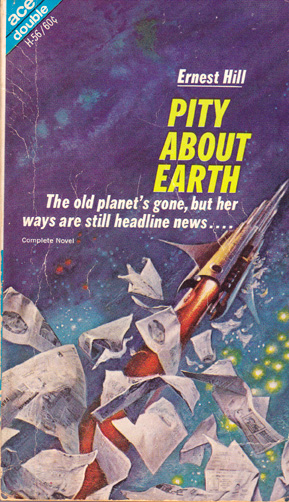
Having finished my current backlog of new books and looking for a mindless diversion, I decided to give this story another chance. On the surface, it's about a newspaper advertising manager, Shale; his assistant, the alien Phrix from the planet Far-Groil; and Marylin, a human-ape hybrid. Set in the far future, long after Earth had been destroyed, Shale travels the galaxy looking for advertisers for the one major intergalactic newspaper, the Lemos Galactic Monitor. His adventures take him to the planet Asgard, home of the fabled, but never seen, Publisher, who sits atop the hierarchy and directs all.
Shale lives in a galaxy where the sole purpose of people is to consume. Newspapers print ads to drive people to buy advertisers products. If there is any news, it's written as a part of the ad. Shale maximizes his desires with no thought to other people. He is a cold-hearted, brutal, thoroughly self-centered hedonist who expects everyone else to be like him. Following the principle of "the survival of the fittest", he has climbed his way to near the top of the publishing world. He is rumored to have killed his mother when he was 14. Before meeting Marylin, he witnesses gruesome experiments done on caged humans in a laboratory engaged in the unfettered pursuit of science. Marylin, a human-ape hybrid produced by the lab, displays an empathy that Shale does not have. As the story progresses, Shale slowly begins to understand her point of view although he never abandons his ways. Phrix simply wants to be left alone to enjoy a contemplative life. He abhors violence and prefers to outwit his opponents. The common man, as epitomized by a police inspector, declaims:
What's good? Good's what sticks to rules and bad's what doesn't. I didn't make the rules, no more than you. ... People, thank Asgard, are conservative. They like things the way they've always known them. That's custom too and don't tell me what's custom isn't always right or I'll go straight back to Gromworld. I'm a policeman and I hope I know right from wrong.
When they reach Asgard, Shale and Marilyn find that there is no Publisher. Phrix, through circumstances not of his own making, finds himself in a position of power through control of the printing presses. He has an opportunity to remake the galaxy, but how should it be changed?
The story is a morality play. Shale represents uncontrolled selfishness. Marylin wants to live by love. Phrix is the mystic. The police officer represents the unreflective masses who think that what is customary is good. God does not exist. In the end, the author asks the question, "absent God, how should man live?" The book leaves that up to the reader.
"PIty About Earth" is a mostly unknown and forgotten book. The web has very little mention of it. One other review is here. I no longer think it's the worst story I've ever read. Perhaps Heinlein's "Beyond This Horizon" will take those honors. But maybe I need to read that book again, too.
Good and Evil, Part 1b
The close connection between ontology and epistemology is easy to see: one can know only what is. But there is an equally close connection between ontology and ethics. Ethics deals with the good. But the good must exist in order to be dealt with. So what is the good? Is it what one or more people say it is? Is it an inherent characteristic of external reality? Is it what God is? Is it what he says it is? Whatever it is, it is something.
I suggest that in worldview terms the concept of good is a universal pretheoretical given, that it is a part of everyone’s innate, initial constitution as a human being. As social philosopher James Q. Wilson says, everyone has a moral sense: “Virtually everyone, beginning at a very young age, makes moral judgements that, though they may vary greatly in complexity, sophistication, and wisdom, distinguish between actions on the grounds that some are right and others wrong.”
Two questions then arise. First, what accounts for this universal sense of right and wrong? Second, why do people’s notions of right and wrong vary so widely? Wilson attempts to account for the universality of the moral sense by showing how it could have arisen through the long and totally natural evolutionary process of the survival of the fittest. But even if this could account for the development of this sense, it cannot account for the reality behind the sense. The moral sense demands that there really be a difference between right and wrong, not just that one senses a difference.
For there to be a difference in reality, there must be a difference between what is and what ought to be. With naturalism--the notion that everything that exists is only matter in motion--there is only what is. Matter in motion is not a moral category. One cannot derive the moral (ought) from the from the non-moral (the totally natural is). The fact that the moral sense is universal is what Peter Berger would call a “signal of transcendence,” a sign that there is something more to the world than matter in motion. --pg 132.
On the one hand, I’m delighted to have found independent confirmation that ethics relates to ought and is, and the acknowledgement of Hume’s guillotine. On the other hand, I’m worried because of the association between this definition and the potentially erroneous step from “there is something more to the world than matter in motion” to a “signal of transcendence.” Has the possible leaven of this conclusion leavened even the definition of good?
We know that there is something more than just “matter in motion.” As Russell wrote:
Russell has to say this, since he denies the existence of Mind, that is, God. The theist can argue that universals exist first and foremost in the mind of God; the naturalist cannot. So what did Berger mean by transcendence? If there is no god, then our thoughts are solely the product of complex biochemical processes: ”matter in motion” gives rise to intelligence. Intelligence gives rise to morality and imagination. No one should argue that the Starship Enterprise is a sign of transcendence. It is simply a mental state which is the result of matter in motion. If imagination is not a “sign of transcendence” then neither is ethics. Berger is assuming that mental states require something more than biochemical reactions which is an assumption that a naturalist need not grant.Having now seen that there must be such entities as universals, the next point to be proved is that their being is not merely mental. By this is meant that whatever being belongs to them is independent their being thought of or in any way apprehended by minds. --The Problems of Philosophy, pg. 97.
Elves
The second is a children’s book, the Adventures of Piffles the Elf, written by David Babulski. David’s wife attends our church so I had the opportunity to talk with him about the book before it was published. A young elf ventures into the world of humans. Was this the rash action of an idealistic youth or the fulfillment of ancient prophecy? Will the consequences wreck destruction upon the elves or will there be a new era of peace between the two races? This is the first book in a planned series of three; the second should be out in 2009 or 2010. While Summa Elvetica is set within a Christian worldview, Piffles has more of a new age flavor. I found it interesting to see how these different worldviews influenced the motivations of the characters.


